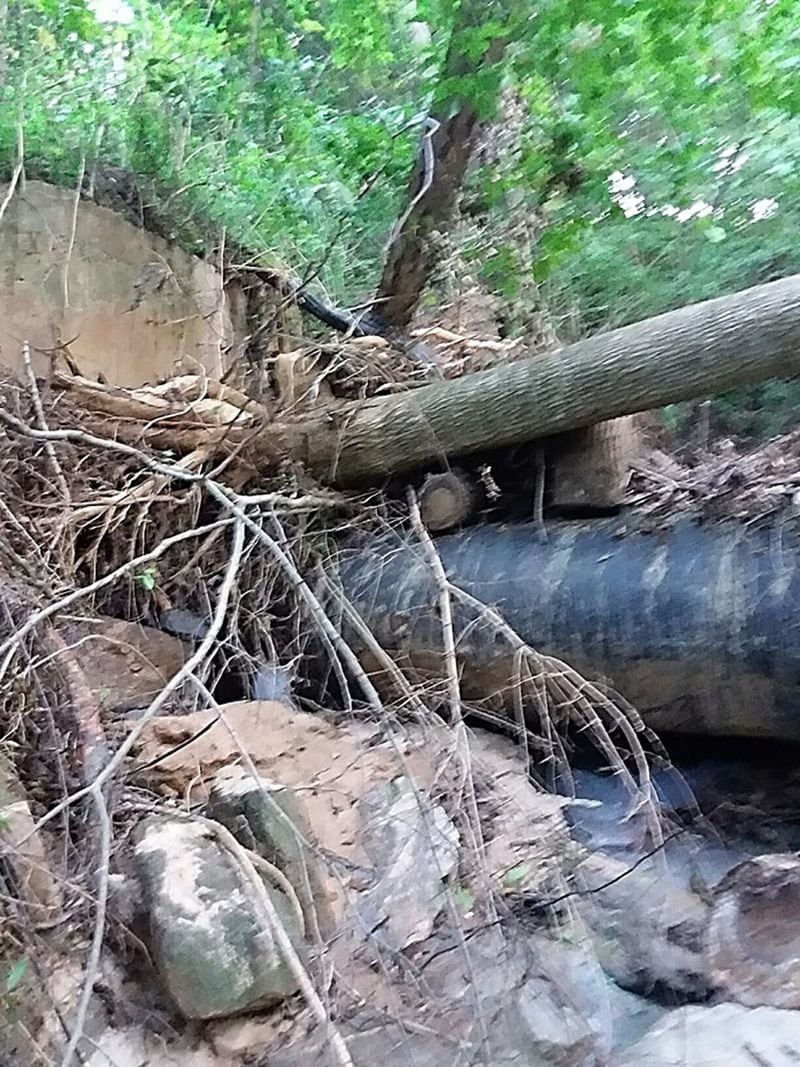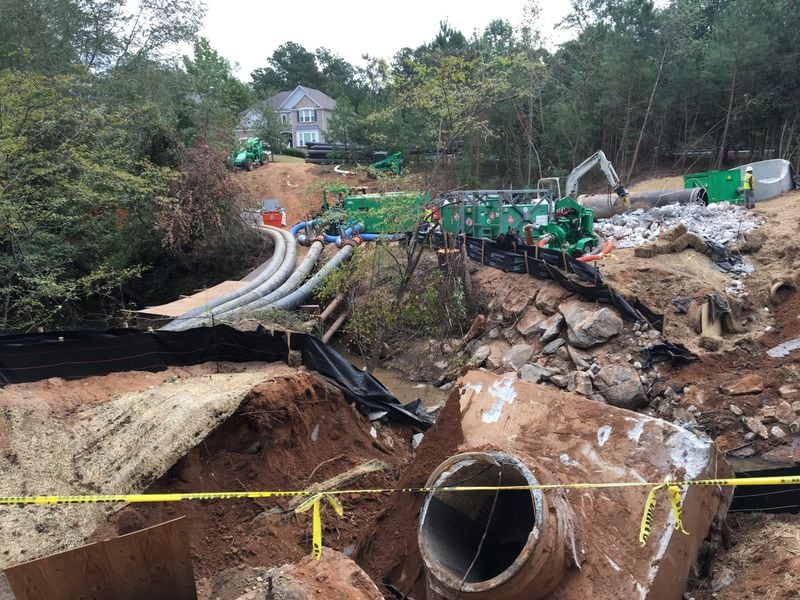Perhaps nothing is more emblematic of DeKalb County’s wholesale neglect of its decaying sewer system than the oak tree that took root atop pipes 20 years ago in an affluent subdivision near Snapfinger Creek.
While investigators probed watershed corruption, the sapling grew unseen. As sewage spills mounted, the shrub gained strength from fertile waste.
No one noticed the emergence of a sturdy oak amid the tangle of pipes, or that its stout trunk, 16 inches across, protruded from the intersection of two large conduits, positioned precariously above the creek.
Until the pipes burst.
That August sewage spill dumped 6.4 million gallons of raw waste into the waterway near Stonecrest. The discharge released more sewage than the previous six years of spills combined and came just days after another giant rupture — this one, 3.9 million gallons — polluted Nancy Creek in Brookhaven.
Already, DeKalb was on track to record the highest number of sewage spills of any year since 2011, when a federal judge ordered the county to upgrade its system. Then came the remnants of Hurricane Irma in September, with its heavy rains that contributed to nine more spills in the week after the storm hit. The county is on pace for 200 spills this year.
In many ways, it seems the county is back to where it started when it entered into a federal consent decree, scrambling to stop a steady stream of waste contaminating public waters with e. coli and other bacteria. The county faces a mid-2020 deadline to finish more than $280 million of upgrades to the deteriorating sewage system.
“The tree crystallizes the dysfunction and mismanagement that has plagued the Department of Watershed Management for decades,” said DeKalb CEO Mike Thurmond. “It’s clear that, in many ways, we squandered the first six years of the consent decree.”
When county workers discovered the huge spill at Snapfinger Creek, it took them six hours to cut through trees and bushes to clear a path for heavy machinery, delaying their efforts to contain the damage.
Pathways to sewer lines haven’t been maintained for a decade. That’s because former county government officials never rebid an easement clearing contract after a lawsuit by the former contractor, Paul Champion. He accused former DeKalb employees of shortchanging him and soliciting bribes, while the county countered that Champion didn’t do the work.
The county settled the lawsuit in February, paying Champion $1.5 million.
Meanwhile, the DeKalb Watershed Department lacked stable leadership, churning through at least six directors over a 14-year period that also saw the launch of a special grand jury investigation. The far-reaching probe led to criminal charges against former CEO Burrell Ellis.
Residents are now paying the costs of that instability and lack of maintenance.
A series of water and sewer rate hikes have increased residents' bills 213 percent since 2007. That money helps fund behind-schedule sewer repairs, $924,000 in fines for spills since the federal consent decree began in 2011, legal payouts and the replacement of 102,000 water meters because of inaccurate billing.
“If we don’t fix these things, we’re going to get hit with more fines, but we’re also going to have more massive repairs to take care of,” said John Miller, a retired civil engineer and the co-chairman of a citizen advisory committee overseeing sewer infrastructure.
Both Miller and Thurmond, who took office Jan. 1, say the county government is getting back on track.
DeKalb has, so far, cleaned 725 miles of sewer pipes, allowing them to handle more sewage without overflowing. It’s the first deep scrubbing in 50 years. About 580 manhole covers have been replaced this year in an effort to prevent rainwater from overflowing sewer lines. The county government is monitoring business growth to avoid putting more strain on fragile, old pipes.
Thurmond ordered inspections of 665 critical creek and stream crossings by the end of this year, and a new easement clearing contract is being bid.
As for the drastic increase in spills, some of that is caused by factors that can’t be controlled, according to the county. There has already been more rain this year in DeKalb — more than 43 inches through Sept. 21 — than all of last year. Rainwater has contributed to 30 weather-related spills so far in 2017 compared to four all of last year.
While spills that reach public waterways are on the rise, overflows on private property and those that don’t reach streams are slightly declining this year, according to the county.
DeKalb Commissioner Nancy Jester wants more professional management of the county’s wastewater system and less politics.
“Clogged sewer pipes and contaminated streams and rivers do not fix themselves by hearing rhetoric and empty promises,” Jester wrote in an open letter to DeKalb taxpayers Aug. 30. “This will only get better if the county administration is transparent and robustly supports the qualified team of professional engineers and our strategic partners without delay.”
Past corruption and inattention led to the sewage problems the county faces today, Thurmond said.
But, he acknowledged, now he's responsible for fixing them.
By the numbers
2,700: Miles of aging sewer lines in DeKalb.
150: Sewage spills that have polluted waterways through September
$924,000: Fines paid by DeKalb for spills since 2001
10 million: Total gallons spilled from two major breaks
MYAJC.COM: REAL JOURNALISM. REAL LOCAL IMPACT.
The AJC's Mark Niesse keeps you updated on the latest happenings in DeKalb County government and politics. You'll find more on myAJC.com, including these stories:
Never miss a minute of what's happening in DeKalb politics. Subscribe to myAJC.com.
About the Author









